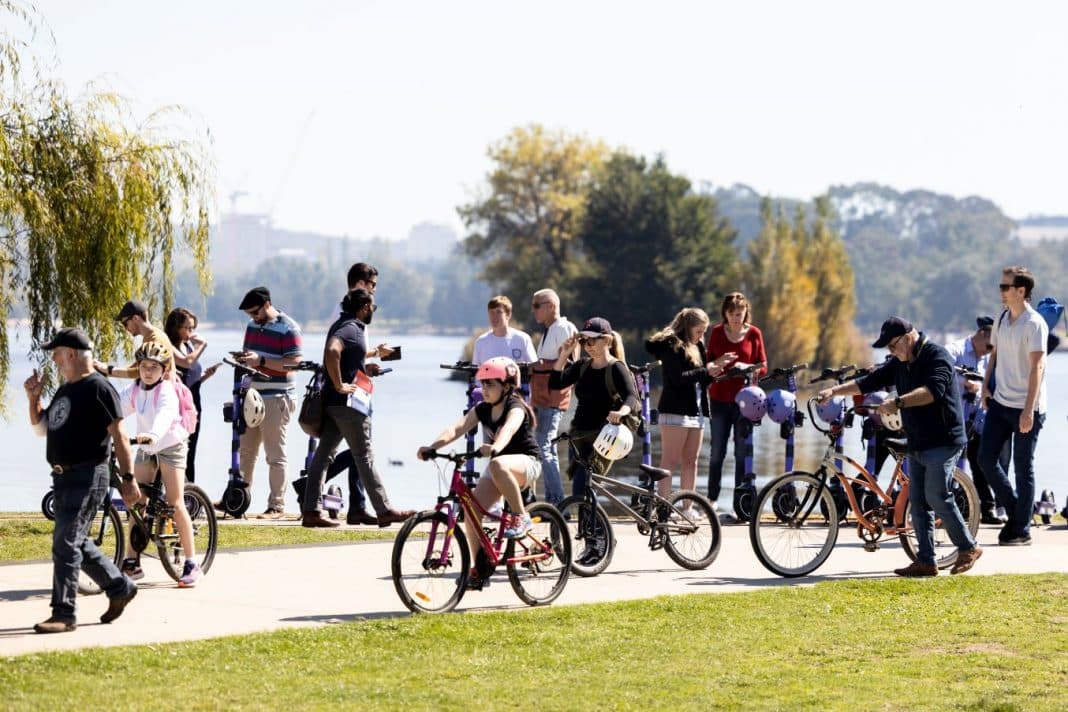Cycling advocacy group Pedal Power ACT believes the ACT Government should discourage driving and encourage cycling to ease the financial burden on Canberrans.
“There are many ways in which increased urban cycling can reduce cost-of-living and improve quality of life for all Canberrans, especially those on low and moderate incomes,” Simon Copland, Pedal Power’s executive director, said in his testimony to the ACT Government’s Inquiry into Cost of Living Pressures in the ACT.
“In the widely dispersed Canberra, transport takes a big and growing chunk out of household budgets. The lower the income, the bigger the chunk.”
In 2016, the ACT Council of Social Service (ACTCOSS) reported that transport consumes 15.1 percent of average weekly household expenditure, Mr Copland remarked. In 2022, Australian Automobile Association data showed that weekly average household transport costs in Canberra rose by more than $75 a week, to an average of $395.79. Cars take up most of these costs.
- Fuel prices up 40 per cent in one year (6 May 2022)
- Australian drivers’ fuel costs hit $100 a week (14 August 2022)
Canberra is one of the most car-dependent cities in the world, Pedal Power stated. More than four-fifths of Canberrans travel to work by car. Australians are buying many more 4x4s, SUVs, and Utes, and fewer small vehicles, which means that motoring costs are increasing faster than ever, while incomes and support benefits are static or declining.
“The cost of owning and running a car is steep and rising, even though many aspects of motoring infrastructure and services are massively subsidised by the community,” Pedal Power stated.
Pedal Power’s submission quotes figures from the Royal Automobile Club of Victoria which show the cost of owning and running a car ranges from $10,286 (light cars) to $19,445 (SUV large).
Electric vehicles are not a viable alternative for low-income households, Pedal Power argues; the average annual cost is $18,496. When internal combustion engines cease production later this decade, this will hit all households with the higher purchase costs of EVs, Pedal Power believes.
Many of the social or hidden costs of driving end up in household rates bills and insurance premiums, Pedal Power claims. These costs include road infrastructure and maintenance, production of concrete and tarmac; road transport workforce costs; morbidity, mortality and mental health problems from stressful and inactive lifestyles, absenteeism, lost productivity, road trauma; crash damage, emergency services – police, ambulance, fire and rescue; pollution and environmental damage, urban noise, loss of amenity; congestion; and planning costs and inefficient land use.
People on low incomes spend a greater proportion of their income on third party insurance premiums than people on higher incomes.
Road congestion is projected to cost the ACT $400 million a year by 2030, Mr Copland remarks. This will impact cost of living for all Canberrans.
An increase in active travel would provide significant relief to all Canberrans, Pedal Power states, as the cost of cycling is minuscule in comparison with driving, and far cheaper than using public transport (around $1,500 in peak-hour return fares over a working year).
“The only cycling overhead would be a healthier appetite and minor bike servicing,” Pedal Power states. “This would be more than offset by extra fitness leading to reduced personal medical bills.”
However, ACT census data shows that across the ACT, fewer than 3 in 100 people cycle to work, “in spite of the obvious financial and health benefits,” Mr Copland said. “But this can be improved by making cycling safer and more convenient for people.”
Pedal Power recommends that the ACT Government build a fast, protected, direct cycle network across the ACT.
“No-one should have to ride on a high-speed road to have to get where they need,” Mr Copland said. “Building segregated cycle lanes is good for everyone – they’re safer for people on bikes, and, through encouraging cycling uptake, will reduce congestion on our roads.
“The ACT Government should … build a fast, protected, and direct cycle network across the ACT.
“While the ACT Government has committed to building such a network in its draft active travel plan, this network is still limited, and there is no new funding or timeline behind these plans. We need to roll it out much faster.
“New technologies such as e-bikes should also feature in the ACT Government’s Sustainable Household Scheme, as their ability to move larger loads faster makes cycling a more valuable option in an increased number of situations.”
Conversely, Pedal Power believes the government should cease actions that make driving easier and more attractive, while providing viable transport alternatives for people throughout the ACT.
This includes widening and duplicating roads. “There is plenty of evidence that increasing road capacity to ‘bust congestion’ actually makes it worse by encouraging more people to drive.”
Pedal Power argues that reduced ACT Government spending on inefficient and counter-productive road projects can constrain rate rises for residents, providing greater benefit for people on low income compared to those on higher incomes.



